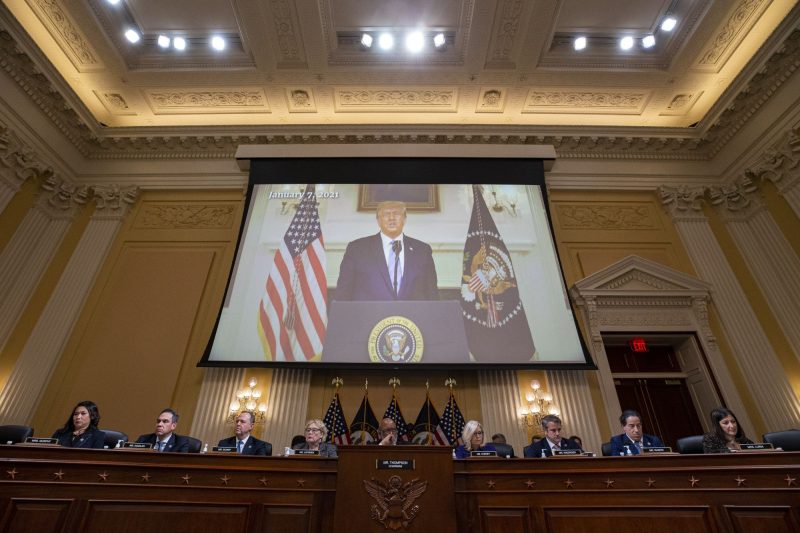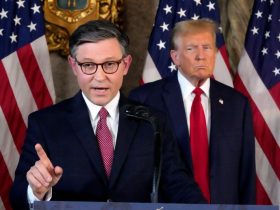Soon after becoming the first president in American history to be the target of a criminal referral for having abetted an insurrection, Donald Trump insisted that, actually, this was a good thing.
“These folks don’t get it that when they come after me, people who love freedom rally around me,” Trump said in a statement. “It strengthens me. What doesn’t kill me makes me stronger.” He then tacked on false claims about his efforts to curtail the violence that unfolded at the Capitol on Jan. 6, 2021 — the aforementioned insurrection.
Setting aside the statement’s dude-who-quotes-Nietzsche vibe, the former president raises an interesting point. He’s made a political career out of parlaying criticism into support, casting himself as the eternal target of devious, desperate hubs of power. Was it true, then, that the House select committee’s investigation actually bolstered his standing among Republicans or Americans more broadly?
It remains to be seen whether the criminal referrals have that effect. But since the committee’s formation in mid-2021, it’s pretty clear that the immediate result of its actions haven’t been to bolster Trump’s standing.
That said, they haven’t often had a negative effect on perceptions of Trump either.
A good measure of how Trump is viewed comes from favorability polling. Asking Americans how they view Trump personally doesn’t tell us whether they might vote for him, but it does allow us to separate what he does from who he is. It’s clear that a lot of people who don’t like Trump voted for him anyway; about 3 percent of the electorate in 2020 had a negative view of Trump but still supported him according to exit polling.
So the question then becomes: How did the House committee’s actions affect Trump’s favorability? Using polling from YouGov, generally published every week or so, we can track the evolution of opinions both overall and among Republicans, his base. Since individual polls can jump around a bit, the charts below use running averages of opinions of the former president.
We can start with two key points from 2021. The first was the vote to instantiate the select committee in early July. Within three weeks of that vote — before the committee conducted any hearings, obviously — Trump’s favorability did, in fact, tick upward. Then, later that month, the committee held its first hearing, featuring members of law enforcement. The effect on Trump’s favorability was negligible.
This year, the committee’s work entered high gear. A series of carefully presented hearings began in early June with a prime time broadcast. Republican views of Trump, already down slightly from the prior summer, didn’t move much. A hearing later that month featuring Cassidy Hutchinson, an aide to Trump’s chief of staff, led to a more obvious decline — but still a small one.
Then there was the last hearing before the midterm elections. Within three weeks of that hearing, Trump’s favorability had dropped more noticeably, both among Republicans and overall. But that was also just before the midterm elections, muddying our ability to identify the committee’s work as a central trigger.
But we can evaluate Trump’s point: There’s no indication that he’s viewed more positively now than he was before the committee was formed. There’s no indication, either, that elevating how he contributed to the events of Jan. 6, 2021, helped strengthen his position with his base.
There was one moment when Trump’s favorability declined quite dramatically: in the aftermath of the Capitol riot itself. Before that point, his favorability among Republicans was over 90 percent. It fell more than five points in three weeks.
Trump still retains high favorability ratings from Republicans. It’s likely that members of his party who were willing to give up on Trump because of Jan. 6 did so at the point the riot occurred, rather than once the full extent of his post-election efforts were revealed. It’s also likely that his relatively low favorability ratings of late are a function not of his loss in 2020 but of Republican losses in 2022, for which he’s given a fair share of blame.
Trump has spent more than seven years serving as a totem for a right-wing population that perceives itself as embattled. It’s natural he would argue that an investigation into his actions in 2020 and early 2021 would be framed in the same way. But it seems to be the case that he isn’t expanding his appeal by playing the victim. Instead, that appeal seems to have long ago maxed out.








